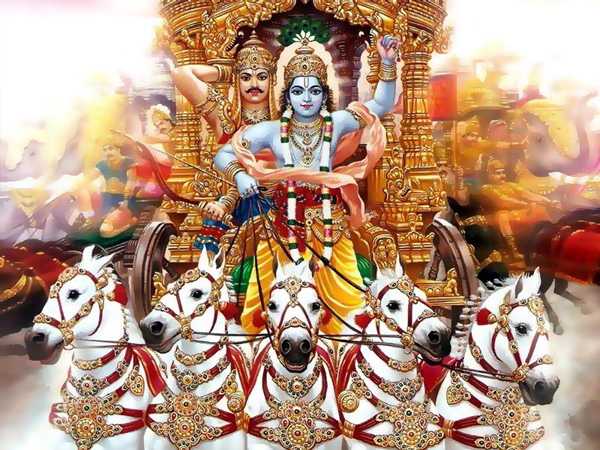Chapter 69

“Vyasa said, ‘Hearing this sacred history of sixteen kings, capable ofenhancing the period of life (of the listener), king Srinjaya remainedsilent without saying anything. The illustrious Rishi Narada then saidunto him thus sitting silent, ‘O thou of great splendour, hast thou heardthose histories recited by me, and hast thou caught their purport? Or,are all these lost like Sraddha as performed by a person of regenerateclasses having a Sudra wife?’ Thus addressed, Srinjaya then replied withjoined hands, ‘O thou that hast wealth of asceticism, having listened tothese excellent and praiseworthy histories of ancient royal sages, all ofwhom had performed great sacrifices with profuse presents unto theBrahmanas, my grief hath all been dispelled by wonder, like the darknessthat is dispelled by the rays of the sun. I have now been cleansed of mysins, and I do not feel any pain now. Tell me, what shall I do now?’
“Narada said, ‘By good luck it is that thy grief hath been dispelled.Solicit thou the boon that thou desirest. Thou wilt obtain all thou maystask. We never say what is not true.’
“Srinjaya said, ‘I am happy with even this, viz., that thou, O holy one,art gratified with me. He with whom thou, O holy one, art gratified, hathnothing unobtainable here.’
“Narada said, ‘I will once more give thee thy son who was fruitlesslyslain by the robbers, like an animal, slaughtered in sacrifice, takinghim out of terrible hell.’
“Vyasa said, ‘Then the son of Srinjaya, of wonderful splendour, appeared,that child resembling the son of Kuvera himself, bestowed by thegratified Rishi (on the bereaved father). And king Srinjaya, once moremeeting with his son, became highly delighted. And he performed manymeritorious sacrifices, giving away profuse sacrificial presents uponcompletion. Srinjaya’s son had not fulfilled the purposes of his being.He had performed no sacrifice and had no children. Destitute of bravery,he had perished miserably and not in battle. It was for this reason thathe could be brought back into life.[123] As regards Abhimanyu, he wasbrave and heroic. He hath fulfilled the purposes of life, for the braveson of Subhadra, having blasted his foes by thousands, hath left theworld, falling in the field of battle. Those inaccessible regions thatare attainable by Brahmacharya, by knowledge, by acquaintance with thescriptures, by foremost of sacrifices, even, these have been obtained bythy son. Men of knowledge always desire heaven by their righteous deeds.They that are living in heaven never prefer this world to heaven.Therefore, it is not easy for any desirable thing that might have beenunattained by him to bring back into the world Arjuna’s son slain inbattle and now residing in heaven. Thy son has attained to that eternalgoal which is attained by yogins with eyes shut in contemplation or byperformers of great sacrifices, or people possessed of great asceticmerit. After death, attaining a new body that hero is shining like a kingin his own immortal rays. Indeed, Abhimanyu has once more got his ownbody of lunar essence that is desirable by all regenerate persons. Hedeserveth not thy grief.[124] Knowing this, be quiet, and slay thy foes.Let fortitude be thine. O sinless one, it is the living that stand inneed of our grief, and not they that have attained to heaven. His sinsincrease, O king, for whom, the living grieve. Therefore, he that iswise, abandoning grief, should strive for (the) benefit (of the dead).The living man should think of the joy, the glory, and the happiness (ofthe dead). Knowing this, the wise never indulge in grief, for grief ispainful. Know this to be true. Rise up! Strive (to achieve thy purpose).Do not grieve. Thou hast heard of the origin of Death, and her unexampledpenances, as also the impartiality of her behaviour towards allcreatures. Thou hast heard that prosperity is unstable. Thou hast heardhow the dead son of Srinjaya was revived. O learned king, do not grieve.Peace be to thee, I go!’–Having said this, the holy Vyasa disappearedthen and there. Upon the departure of that master of speech, thatforemost of intelligent persons, viz., the holy Vyasa, whose colour waslike that of the clouded sky, Yudhishthira, having derived consolation inconsequence of what he had heard about the sacrificial merit andprosperity of these great monarchs of olden times, possessed of energyequal to that of the great Indra himself and all of whom had acquiredwealth by righteous means, mentally applauded those illustrious personsand became freed from grief. Once more, however, with a melancholy hearthe asked himself, saying, ‘What shall we say unto Dhananjaya?'”




